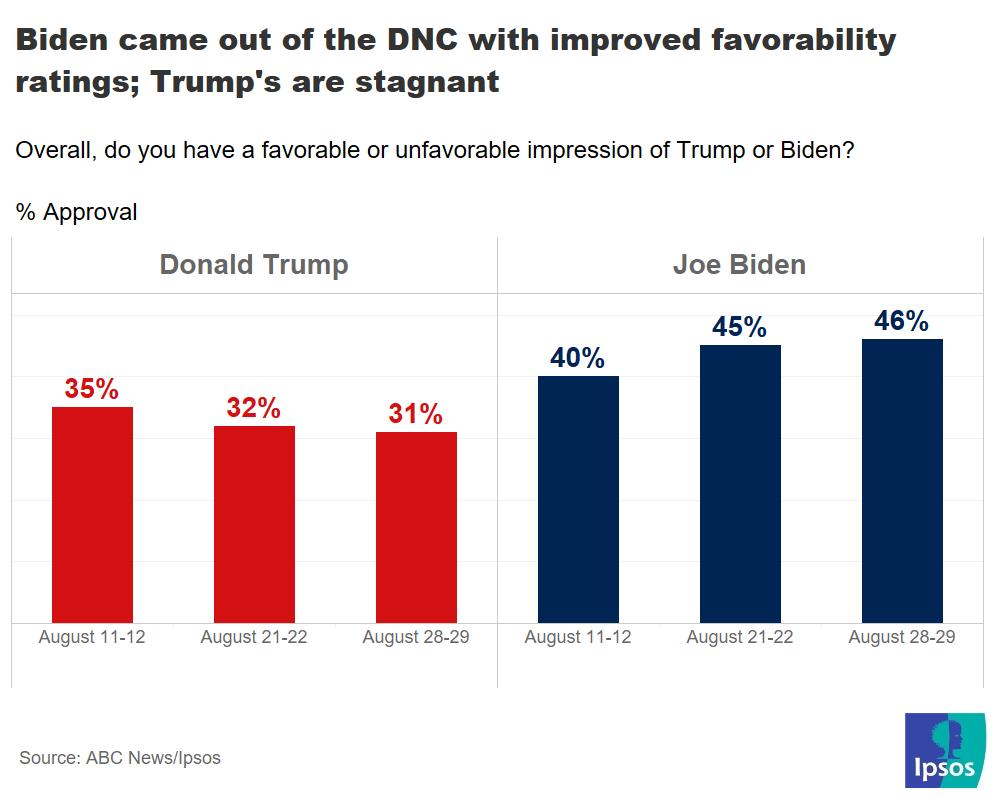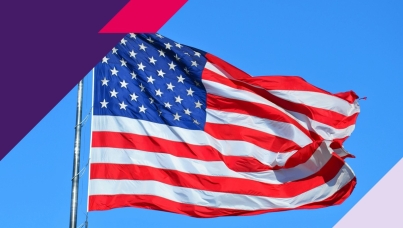No post-RNC bounce for Trump or Biden
What you need to know:
- Historically, candidates can expect to come away from the party conventions with a momentary bump in the polls. In this very atypical election year, the signals are more mixed.
- The horse race polls are largely static but Biden’s favorability ratings are rising, moving from 40% in mid-August to 46% in the most recent ABC News/Ipsos survey. Meanwhile, Trump’s favorability ratings sit at 31%.
- A majority of Americans (53%) approved of the Democrats messaging at the DNC; just 37% approved of what the Republicans had to say at the RNC.
- Polling shows that there is a smaller pool of undecided voters than usual and that Americans are preoccupied with the coronavirus, crime and violence, and rising extremism, but see these issues through a partisan lens.
Deep dive:
In a typical election cycle, candidates often see a temporary boost in the polls after a convention, riding a wave of enthusiasm and party unity.
This year is different. Between a once-in-a-hundred-year pandemic and a smaller than usual pool of undecided voters, neither major party nominee won a post-convention boost. With the two party conventions over and done with, horse race polling shows that President Donald Trump and Joe Biden are in a similar place to where they were before the conventions kicked off.
But while voter intent didn’t shift, Americans warmed to the DNC’s portrayal of Biden as a man of empathy. Between the week before and after the DNC, his favorability rating moved up, from 40% to 46%, according to ABC News/Ipsos polling. More tellingly, his favorability ratings shifted to net positive; more Americans now view Biden favorably than not. By contrast, Trump’s favorability ratings are more stagnant and remain net negative.

Messaging at the two conventions was varied, reflecting polarized views around some of the top issues of the day. Ipsos polling shows that 55% of Americans see the coronavirus as a top concern, followed by unemployment – which stood at 10.2% in July – and crime and violence. Worries about extremism spiked 13 points from June to July amid ongoing protests against police violence that, in some instances, devolved into violent unrest.
Americans see these issues through a partisan lens, as a recent NPR/Ipsos survey underscores. Democrats are more likely to see the coronavirus and racial injustice as top concerns, while Republicans are more focused on extremism and immigration. Both conventions stuck to portraying these issues in ways that would resonate with the base.
Post-convention analysis finds that the DNC’s messaging had broader appeal relative to the RNC. Just over one in three of all Americans (37%) approved of Republican messaging at the RNC, compared to the 53% who approved of what Democrats had to say at the DNC. While the party faithful predictably stayed true to their partisan stripes, ABC News/Ipsos polling found that Independents tilted in favor of the Democrats, with 51% saying they approved of what was said at the DNC, relative to the 39% who approved of what was said at the RNC.
Heading into the election Americans see the current moment as a tipping point, albeit for very different reasons. A majority on both sides of the aisle believe that we are caught in a “battle for the soul of the nation.” Hyper-partisanship is at an extreme, with little consensus around the more pressing issues of the day.
Set against this backdrop, the absence of significant movement in the polls post-convention should not come as a surprise – even with Biden’s improved favorability ratings and the nation’s more positive response to the tone of the DNC. For more than a year, Trump’s approval ratings have remained remarkably stable. Many Americans have made their decision already and do not appear to be deviating from their chosen course. If an impeachment, pandemic, and economic upheaval so far have failed to change minds, why would a party convention?



